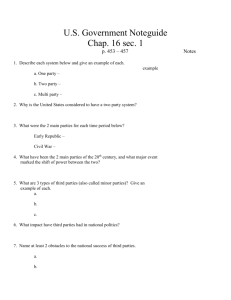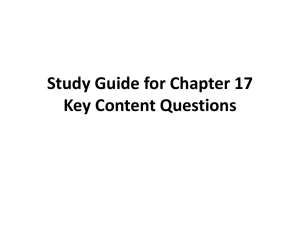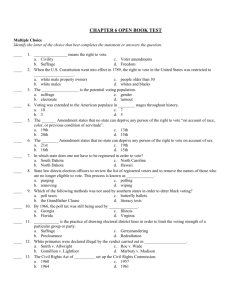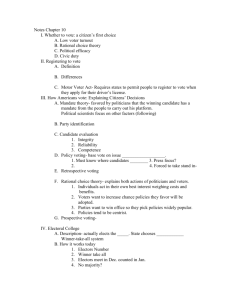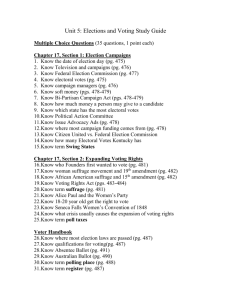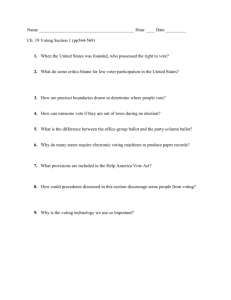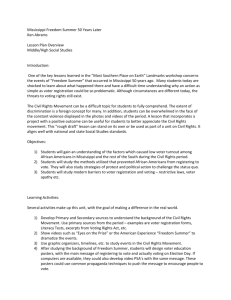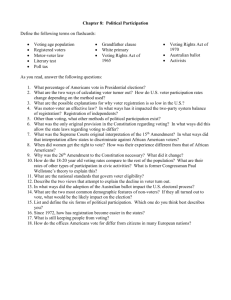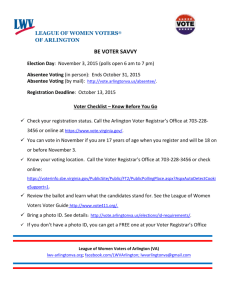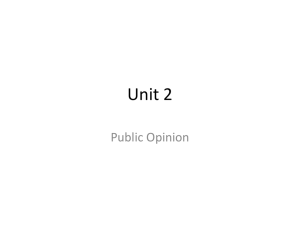Political Culture, Opinion, and Ideology practice questions and
advertisement
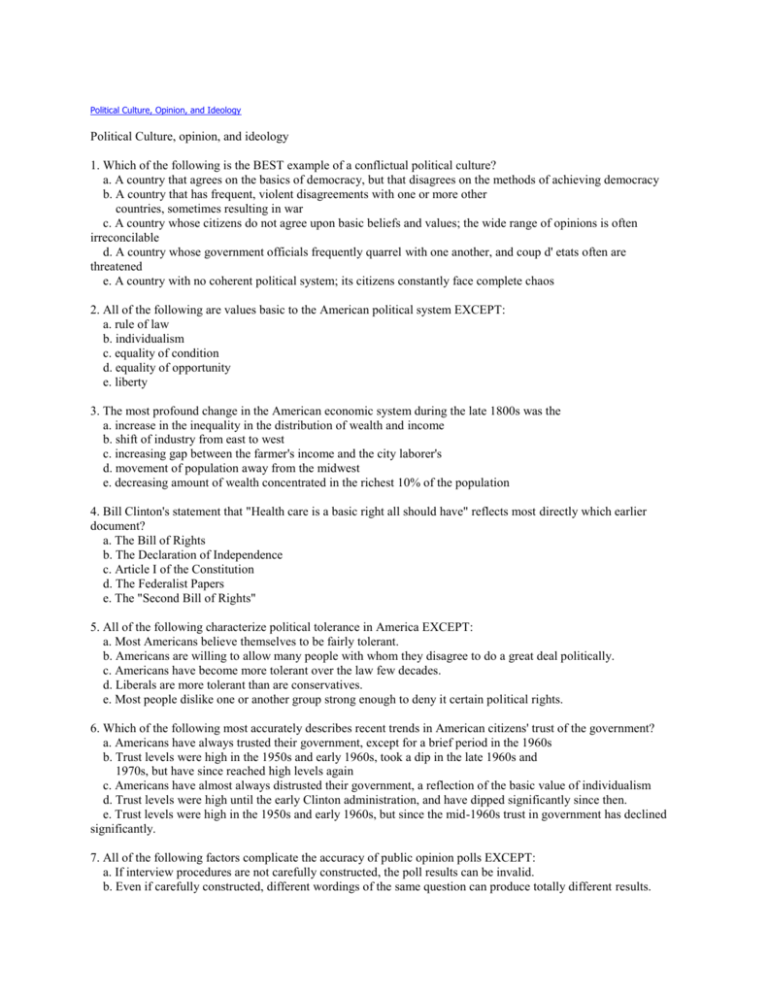
Political Culture, Opinion, and Ideology Political Culture, opinion, and ideology 1. Which of the following is the BEST example of a conflictual political culture? a. A country that agrees on the basics of democracy, but that disagrees on the methods of achieving democracy b. A country that has frequent, violent disagreements with one or more other countries, sometimes resulting in war c. A country whose citizens do not agree upon basic beliefs and values; the wide range of opinions is often irreconcilable d. A country whose government officials frequently quarrel with one another, and coup d' etats often are threatened e. A country with no coherent political system; its citizens constantly face complete chaos 2. All of the following are values basic to the American political system EXCEPT: a. rule of law b. individualism c. equality of condition d. equality of opportunity e. liberty 3. The most profound change in the American economic system during the late 1800s was the a. increase in the inequality in the distribution of wealth and income b. shift of industry from east to west c. increasing gap between the farmer's income and the city laborer's d. movement of population away from the midwest e. decreasing amount of wealth concentrated in the richest 10% of the population 4. Bill Clinton's statement that "Health care is a basic right all should have" reflects most directly which earlier document? a. The Bill of Rights b. The Declaration of Independence c. Article I of the Constitution d. The Federalist Papers e. The "Second Bill of Rights" 5. All of the following characterize political tolerance in America EXCEPT: a. Most Americans believe themselves to be fairly tolerant. b. Americans are willing to allow many people with whom they disagree to do a great deal politically. c. Americans have become more tolerant over the law few decades. d. Liberals are more tolerant than are conservatives. e. Most people dislike one or another group strong enough to deny it certain political rights. 6. Which of the following most accurately describes recent trends in American citizens' trust of the government? a. Americans have always trusted their government, except for a brief period in the 1960s b. Trust levels were high in the 1950s and early 1960s, took a dip in the late 1960s and 1970s, but have since reached high levels again c. Americans have almost always distrusted their government, a reflection of the basic value of individualism d. Trust levels were high until the early Clinton administration, and have dipped significantly since then. e. Trust levels were high in the 1950s and early 1960s, but since the mid-1960s trust in government has declined significantly. 7. All of the following factors complicate the accuracy of public opinion polls EXCEPT: a. If interview procedures are not carefully constructed, the poll results can be invalid. b. Even if carefully constructed, different wordings of the same question can produce totally different results. c. Interview samples are usually too small; a sample of 1500 to 2000 participants cannot accurately reflect the views of millions of people d. People are often not well informed about the issues, so their responses can skew results significantly e. Random samples usually must be divided into sub-groups of the population in order to insure accurate representation 8. All of the following sponsor national opinion polls EXCEPT: a. candidates for national public office b. private firms, such as Gallup Polls c. Major television stations and newspapers d. the national government e. the Supreme Court 9. Suppose that a researcher receives different results for the following two questions: "Do you think the president is doing a good job?" "Please rate the president in terms of his job performance: excellent, very good, good, average, poor, very poor." In all likelihood the different results are cause by a. the different wording and structure of the questions b. a faulty random sample c. the interviewees' lack of knowledge of the subject matter d. poor interview procedures e. a small sampling error allowance 10. Suppose a researcher is conducting a poll on public opinion about Roe v.Wade (a 1973 Supreme Court decision that is usually perceived as pro-abortion).The results show that 47% of those polled support overturning the decision and 53% don't believe it should be overturned. The sampling error is + or - 3. How should the results be interpreted? a. Provided that the research was conducted properly, the majority of the American public do not support overturning the amendment. b. The research is questionable in value because few people really understand Roe v.Wade. c. Because the issue is so emotionally charged, the results are probably not accurate. d. Because of the sampling error, a definitive statement is impossible about which side the majority of the American public take on the issue of abortion. e. The majority of the American people seem to support overturning the Court decision. 11. Which of the following factors is probably the most important determinant of an individual's political party affiliation? a. family, particularly his or her mother and father's party affiliation b. gender c. ideological conviction d. religion e. social class 12. Women are more likely than men to a. vote in general elections b. affiliate with the Democratic party c. support defense spending d. consider political irrelevant e. support female candidates for office 13. The relationship between social class and political attitudes is a. much stronger than it used to be b. nonexistent; social class does not appear to affect political attitudes c. complicated because the correlation between higher social class and conservatism has been blurred by the liberalizing effect of college education d. complicated because the traditional relationship between the working class and conservatism has blurred in recent years e. clear-cut; a strong correlation exists between higher social class and conservatism 14. "Born-again Christians" are likely to hold conservative views on all of the following issues EXCEPT: a. abortion b. job guarantees c. women's rights d. minority rights e. gay rights 15. Which of the following is the best description of the relationship of black Americans to the Democratic party? a. Blacks supported the Democratic party until the 1950s, but are now more likely to be Republicans b. Blacks supported the Democratic party from the 1950s through the 1970s, but are now more likely to be Republicans c. Blacks supported the Republicans until the 1970s, but are now much more likely to be Democrats. d. Black Americans are no more likely to support the Democratic party than are other major racial groups in the U.S. e. black Americans are the most consistently liberal group within the Democratic party. 16. A limited amount of research indicates that Asian Americans a. are more liberal than Hispanics, but more conservative than blacks b. hold distinctive views by nationality, but are generally more conservative than are blacks and Hispanics c. are more liberal than Caucasians and Hispanics, but are more conservative than blacks d. do not identify strongly with either political party, but tend to consider themselves "independents" e. are inactive in politics, but tend to identify with the Democratic party 17. According to the classic study The American Voter, all of the following are basic categories of reasons that citizens vote as they do EXCEPT a. ideology b. group benefits c. nature of the times d. none-issue based reasons e. the region in which the voter lives 18. All of the following are findings of Verba and Nie's study of political participation EXCEPT: a. Only a small percentage of Americans can be classified as complete political activists. b. More people reported voting regularly in presidential elections than the actual statistics support. c. Voting is the most commonly reported type of political participation. d. Between the citizens classified as complete activists and complete inactivists, are categories for campaigners, communalists, contacters, and voting specialists. e. A surprisingly large number of Americans have participated in organized political protests. 19. Which of the following suffrage movements was established FIRST in American history? a. universal manhood suffrage b. black suffrage c. women's suffrage d. suffrage for 18-21 year olds e. suffrage for the homeless 20. Which of the following countries has the lowest voter turnout as a percentage of voting-age population? a. Great Britain b. Canada c. Italy d. Australia e. the United States 21. Which of the following provides the BEST evidence that voter registration procedures are the the most important block to voting in the United States? a. A large number of eligible American voters do not register to vote. b. Americans are too cynical about politics; they don't bother to register to vote. c. The registration rate in rural areas is much lower than in urban areas; voters have to travel farther in rural areas to register to vote. d. Voters in southern states are not as likely to vote; southern states do not provide easy access to voter registration centers. e. Americans vote at much lower rates than do citizens of other modern democracies 22. What was the main purpose of the National Voter Registration Act of 1993? a. to control abuses at the ballot box b. to ease the process of voter registration c. to encourage people to vote independently, not just in party primaries d. to discourage members of minority groups from voting e. to widen the gap between eligible voters and registered voters 23. All of the following are important reasons for low voter turnout in the U.S. EXCEPT: a. Voters have a low level of external political efficacy. b. Numerous elections and candidates make it more difficult for the voter to keep up with campaigns and vote intelligently. c. Political parties in the U.S. do not coordinate elections as carefully as they do in many other countries. d. The degree of corruption in the American political system discourages citizens from voting. e. Elections in the U.S. are usually held during the work week when many adults are working. Answers 1. C 2. C 3. A 4. E 5. D 6. E 7. C 8. E 9. A 10. D 11. C 12. B 13. C 14. B 15. E 16. B 17. E 18. E 19. A 20. E 21. A 22. B 23. D
